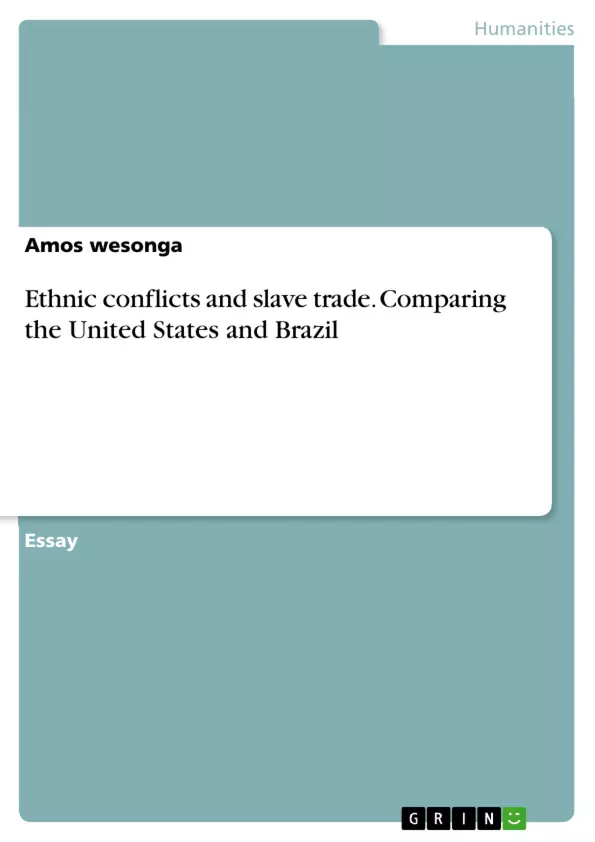In the 19th century, the slave trade was conventional in the American continents. Human trafficking was a typical business activity in the region, where Africans were sold in large farms to provide labor in large plantations. The United States and other developing nations such Brazil have a similar history with the slave trade. The abolishment processes in these two countries were through the development of anti-slavery laws that aimed at denying dominant whites the rights to own slaves.
In the United States, the 13th Amendment was a pivotal point for the abolishment of human trafficking. A section of the American politician known as anti-slavery Republican Party sought to counter the expansion of slave trade and not suppress it entirely. As a result, the effectiveness of the American efforts to abolish slave business remains questionable. The scope of the regulations made may have played a significant part in promoting ethnic divisions in the US. Regarding Brazil, the foundation of the slave trade was quite extensive; hence, played a substantial role in preventing an active development of the anti-slavery movement.
During the 1700s and 1800s, many nations such as the British Empire, France, and North America were abolishing slave trade. However, Brazil had the number of slave imports accelerate at an average rate of 5.7% during this period. Similar to the U.S., the effectiveness of the laws used to control slave trade in Brazil is questionable. Thus, this essay aims at comparing the manner in which U.S. and Brazil handled the transition of former slaves to free citizens. The primary objective is to determine the reasons ethnic conflict reduced in one country than the other. Notably, this paper will use historical intuitionalism and cultural theories to compare the two countries. However, the exploration is limited to the explanation of significant differences that exist between US and Brazil in handling the transition from slavery to citizenship and the recent appearance of ethnic conflict in the two countries.
Inhaltsverzeichnis (Table of Contents)
- Introduction
- Theories
- Historical Institutionalism Theory
- Cultural Theory
- Comparative Analysis
- Assessment
Zielsetzung und Themenschwerpunkte (Objectives and Key Themes)
This essay examines the transition of former slaves to free citizens in the United States and Brazil, aiming to understand why ethnic conflict diminished more in one country than the other. The analysis utilizes historical institutionalism and cultural theories to highlight key differences in the handling of slavery and its impact on contemporary ethnic tensions.
- The impact of historical institutional practices on ethnic conflict.
- The role of cultural theories in understanding ethnic tensions.
- The experience of African-American cultural trauma and its influence on identity.
- The comparative analysis of racial segregation and discrimination in the US and Brazil.
- The persistence of racial divisions and inequalities in both countries despite the abolition of slavery.
Zusammenfassung der Kapitel (Chapter Summaries)
- Introduction: This section introduces the historical context of slavery in the US and Brazil, highlighting the similar experiences with the slave trade and the abolishment processes through anti-slavery laws. It emphasizes the questionable effectiveness of these laws in truly ending slavery and fostering social integration, setting the stage for the comparative analysis.
- Theories: This section introduces two theoretical frameworks: historical institutionalism and cultural theory. It explains how these theories will be used to analyze the impact of institutional structures and cultural dynamics on ethnic conflict in the US and Brazil.
- Comparative Analysis: This section explores the experiences of African Americans in the US and the Black population in Brazil. It compares the levels of racial segregation and discrimination in the North and South of the US, highlighting the continued challenges faced by African Americans despite the Civil Rights movement. The section also discusses the resistance efforts of Black populations in both countries, including the formation of self-governing communities and the emergence of activist movements.
Schlüsselwörter (Keywords)
The key focus topics of this essay are ethnic conflict, historical institutionalism, cultural theory, racial segregation, discrimination, slavery, civil rights, African-American cultural trauma, and comparative analysis of the United States and Brazil.
Frequently Asked Questions
What is the main comparison between the US and Brazil in this essay?
The essay compares how the United States and Brazil handled the transition of former slaves to free citizens and why ethnic conflict diminished more in one country than the other.
What role did the 13th Amendment play in the US?
The 13th Amendment was a pivotal point for the abolition of slavery in the US, although the essay questions its effectiveness in fully suppressing the slave business and preventing ethnic divisions.
How did the abolition process differ in Brazil?
In Brazil, the slave trade was so extensive that it prevented the active development of an anti-slavery movement for a long time, with slave imports even accelerating while other nations were abolishing the trade.
What theories are used to analyze these ethnic conflicts?
The paper utilizes Historical Institutionalism Theory and Cultural Theory to explain the differences in handling the transition from slavery to citizenship.
What is African-American cultural trauma?
It refers to the collective psychological and social impact of slavery and segregation on the identity and contemporary experience of African Americans.
- Quote paper
- Amos wesonga (Author), 2016, Ethnic conflicts and slave trade. Comparing the United States and Brazil, Munich, GRIN Verlag, https://www.grin.com/document/429316



